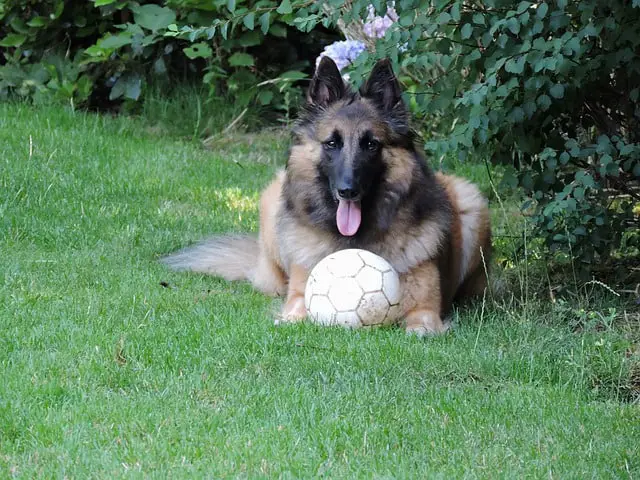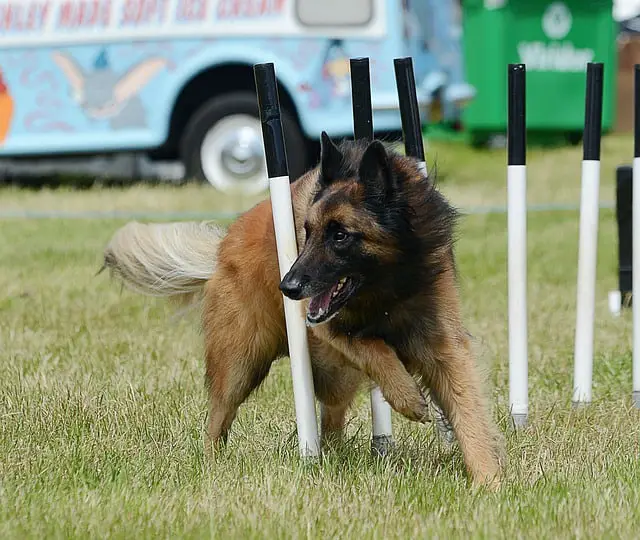The Belgian Tervuren is another variety of the wonderful Belgian shepherd breeds which also include the Belgian Groenendael, Laekenois, and Malinois.
The Tervuren is another look-alike of the German shepherd with definite similar facial features but with something different about their body that you just can’t put your finger on.
The dissimilarity is their coat, which is double thick like the German shepherd’s but more well endowed with an abundance of fur with a fluffy bushy appearance.
The Belgian Tervuren’s coat is thick and long with extra fluff around the neck, giving the appearance of a lion’s mane. This extra fur is called a collarette.
Belgian Tervuren does require grooming to keep them looking dapper. While brushing your Belgian, it’s good to check out the skin underneath all of that fur for any skin issues or irritation and also to ensure your pup has no excessive hair loss.
Skin and coat conditions can be caused by many underlying diseases but also allergies. Yes, dogs can develop allergies just like humans.
The following article will include Belgian Tervuren allergies, symptoms and treatment, and also Belgian Tervuren allergies causes.

For your dog’s vitamin supplement, foods, toys, or other dogs product please visit the Health Extension website.
Belgian Tervuren Allergies Causes, Symptoms, and Treatments
So, you think you’re the only one who suffers from allergies with all of that sniffling, sneezing, and itching? No way! Dogs can definitely develop allergies and so can your Belgian Tervuren. Belgian Tervuren, in fact, is prone to allergies.
This does not mean they’ll develop them, but it’s good to be informed and know what the signs are.
Allergies occur when a normally innocent substance comes in contact with your dog’s body in some way that their immune system identifies it as harmful and attacks causing an allergic reaction with many uncomfortable symptoms.
Below are the types of allergies along with causes, symptoms, and treatment.
Environmental Allergies
Environmental allergies are more like seasonal allergies, caused by airborne irritants. These allergens can be from either indoor or outdoor sources and may be caused by:
Environmental Allergies Caused
- Mildew
- Mold
- Perfumed cleaners
- Scented candles
- Dust
- Pollen
- Grasses
Environmental Allergies Symptoms
- Watery eyes
- Runny nose
- Itchy skin
- Scratching
- Rashes
- Hot spots
- Red, inflamed skin
- Sores and oozing
- Eventual skin infection
To check your Belgian Tervuren health status or their DNA, please visit the Embark vet website for all other help you may need.

Treatments for Environmental Allergies may include
- Elimination of allergens when possible
- Air purifiers in the home
- Frequent vacuuming and dusting
- Bathing to remove outdoor pollens from skin and coat
- Antihistamines such as Zyrtec
- Omega 3 fatty acid supplements
- Immunotherapy (allergy shots)
Allergies from Parasites
Most dogs will acquire some type of parasite during their lifetime no matter how diligent you are with their grooming and especially if they spend a lot of time outdoors.
Some parasites are fleas, mites, and ticks and dogs can have allergic reactions from bites with the saliva or feces being the known allergen. Many dogs are especially allergic to flea saliva and present with flea allergy dermatitis.
- Fleas
Fleas especially cause intense itching. Fleas cannot fly, but jump and they do multiply rapidly while feeding off your pup’s blood. Symptoms are:
- Excessive licking, biting, and scratching
- Fur Loss
- Open sores
- Scabs
- Eventual skin infections if left untreated
Preventing fleas is the best way to go so you don’t have to deal with fleas that can quickly become full-blown infestations. In this case, your home needs to be treated as well as a pup. Prevent fleas with:
- Flea collars
- Flea pills (monthly or every three months)
- Fleas drop (monthly or every three months)
If fleas do become Problem Treatments are:
- Bathing your Tervuren with flea shampoo
- Flea powder
- Flea dip
- Wash all of your pup’s bedding and toys
- Flea bomb for your home
- Hire an exterminator, if the situation is out of hand
- Mites
Mites are another parasite and are known as arthropods. They are extremely minuscule but can cause big problems.
Dust mites are one type of mite and live in bedding, carpets, and furniture, feeding off dander, or dead skin and hair. Dogs are allergic to mite feces.
Ear mites are another type of mite that can make your pup miserable by feeding off of ear wax and making your pup’s ears extremely itchy. Symptoms of mite are:
- Itching and scratching
- Itchy, red skin
- Itchy ears
- Broken open skin from scratching
- Red ears
- Brown discharge from ears
- Ear infections
Treatments for Mites
- Vacuuming and dusting regularly
- Cleaning your Belgian Tervuren’s ears
- Ear mite drops
- Treat every animal in your home because ear mites are super contagious (not to humans though)
- Medication for any other type of mite
Ticks
Ticks or arachnids, another parasite, can also create huge problems. Just one tick, depending on the type, can cause an allergic reaction, as well as diseases like Lyme disease, babesiosis, and Rocky Mountain, spotted fever. These can all have long-term medical effects if left untreated.
Ticks attach to your Belgian’s skin and suck their blood. An infestation of many ticks can cause anemia. Symptoms can be:
- Itching
- Scratching
- Open sores
- Skin infection
- Fever
- Joint pain
Treatments for Ticks
- Always check your dog for ticks especially when outdoors
- Remove the tick with a special tool for tick removal or have your vet remove
- Antibiotics like doxycycline to ensure they don’t get any of the above-listed diseases or to treat them
Contact Allergies
Contact allergies are just that, an allergic reaction caused by something your Belgian has come in contact with. Generally, this can be:
- Rug cleaner
- Fabric softener
- Flea drops or Flea collar (Ingredients)
Contact Allergies Symptoms:
- Itching
- Scratching
- Oozing
- Red, inflamed skin
- Dermatitis
- Eventual infection if left untreated
Contact Allergies Treatment
- Identify the “trigger” (eliminating the trigger may be all it takes to clear)
- Cortisone cream or ointment
- Oral steroids (if severe)
- Antibiotics for infection
- Soothing oatmeal baths
Food allergies
Again, like humans, dogs can develop allergies to some foods. Figuring out which food is a difficult task.
They normally wouldn’t be allergic to their whole dog food, just a certain ingredient or ingredients.
That’s what’s so difficult. This is when you need to become a detective. The usual suspects are generally proteins such as:
- Fish
- Lamb
- Pork
- Chicken
- Beef
- Eggs
- Dairy
- Soy
Also Grains:
- Oats
- Corn
- Barley
- Rice
Food Allergies symptoms are
- Itching
- Scratching
- Rashes
- Red, inflamed skin
- Open sores
- Skin infections
- Itchy ears
- Ear infections
- Gastrointestinal issues; vomiting and/or diarrhea
Treatment for food allergies is changing dog food. There are plenty of great hypoallergenic dog foods for those suffering from food allergies.
Symptoms generally clear once the allergen is out of their system, although they may need some steroid creams or ointments in the meantime.
Dogs rarely go into anaphylactic shock from food allergies like some humans do when consuming nuts or shellfish. Certain breeds may occasionally develop breathing problems or asthma when there is a food allergy.
Bees
Yes, bee stings can cause an allergic reaction in dogs. Most times if your Belgian Tervuren is stung by a bee, the reaction will be mild with just minor swelling and pain.
The stinger should be removed and the area disinfected. NSAIDs can also be used for pain and swelling.
If your Belgian is allergic, the reaction could be more severe with a sudden onset of:
- Itching
- Hives
- Redness and swelling
- Diarrhea
- Vomiting
In rare cases, anaphylactic shock can occur:
- Wheezing
- Difficulty breathing
- Blue-tinted skin
- Fainting
- Collapse
Getting emergency medical help is imperative and as quickly as possible. Keep baby Benadryl on hand for any severe allergic reactions to administer until you get help. The baby formula is not as strong as the adult and is more suitable for a dog.

Allergy Diagnosis in a Belgian Tervuren
Diagnosing allergies can be very daunting. Different allergies appear with many of the same symptoms. Is it an allergy to food or the environment?
If you’ve used a new fabric softener or fed your Belgian Tervuren something different, then the allergen may be easier to identify.
If your pup is having symptoms and you just can’t figure it out, your veterinarian may be able to help identify the “trigger” with either a blood test or pinprick test.
Hopefully, your Belgian Tervuren will never develop allergies. Always check out your Belgian’s skin underneath their mass of fur while grooming.
Not only can you catch fleas before it’s a giant problem but you will observe any dry, flaky skin, rashes, etc. before things become too advanced.
Never hesitate to get your veterinarian involved if there is any kind of skin issue you are worried about.